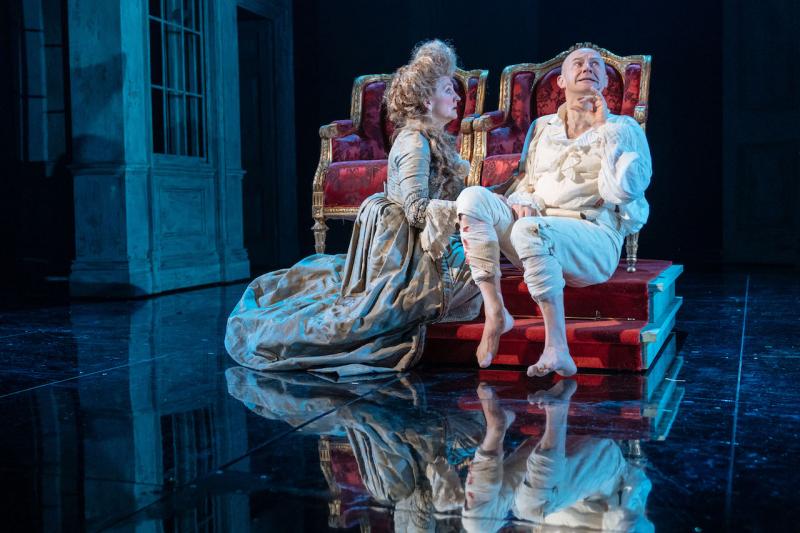The Madness of George III, National Theatre at Home review – a powerful, elegant depiction | reviews, news & interviews
The Madness of George III, National Theatre at Home review – a powerful, elegant depiction
The Madness of George III, National Theatre at Home review – a powerful, elegant depiction
A story told with the wit and elegance of a tune played on a harpsichord

It has been the fate of George III – who on many levels was a visionary and accomplished monarch – to go down in history as a comic figure, most famed for losing first America and then his mind.
That is due not least to an extraordinary performance from Mark Gatiss in the title role. Gatiss arrives in this production on the wings of a prolific and varied TV career, yet here he demonstrates himself to be every bit as much a creature of the stage as he charts George’s decline from benign eccentricity into verbally incoherent despair.
Gatiss fans are familiar with the biographical detail that he grew up opposite Winterton Psychiatric Hospital in County Durham, where his father was chief engineer. Many have connected that time of his life with some of the more gothic manifestations of The League of Gentlemen, but he himself has declared that it was far more helpful for his portrayal of what he has diagnosed as the king’s “massive nervous breakdown”.
 There is no shortage of detail in Alan Bennett’s deft, funny script as to why anyone in George’s position might find themselves tipped over the edge. This first bout of madness (it recurred in 1801 and finally in 1810) began in 1788, not a great time for monarchs in general given what would happen to France’s Louis XVI a year later in 1789. England was far from immune to the tensions that led to the French revolution, and though the assassination attempt on George shown at the start of the play is comically inept, it demonstrates the undercurrents of political hostility against him. Beyond that he is clearly haunted, on a political level by the loss of America, and on a personal level by the death of his son Octavius – a tragedy compounded by the fact that his oldest surviving son is a corpulent troublemaker greedy for his throne.
There is no shortage of detail in Alan Bennett’s deft, funny script as to why anyone in George’s position might find themselves tipped over the edge. This first bout of madness (it recurred in 1801 and finally in 1810) began in 1788, not a great time for monarchs in general given what would happen to France’s Louis XVI a year later in 1789. England was far from immune to the tensions that led to the French revolution, and though the assassination attempt on George shown at the start of the play is comically inept, it demonstrates the undercurrents of political hostility against him. Beyond that he is clearly haunted, on a political level by the loss of America, and on a personal level by the death of his son Octavius – a tragedy compounded by the fact that his oldest surviving son is a corpulent troublemaker greedy for his throne.
Gatiss begins the play by revelling in George III’s determined bumbling ordinariness – one particularly amusing scene sees him and Debra Gillett’s Queen Charlotte cheerily addressing each other as Mr and Mrs King in bed. The first sign of his forthcoming breakdown comes simply in a lilt of the voice: as he describes the gruesome torture of a Frenchman ripped apart by horses, a slight faltering in his tone suddenly reveals the depth of his pain at the cruelty of the world around him. In the full onset of madness we watch him switch between rage and plaintiveness, mania and desolation as he roams across the stage, bald and half-naked as an escapee from Bedlam in a Hogarth cartoon. Gatiss’s career has been marked in recent years by his urbane, elegant embodiments of those in power, yet here he gives a simultaneously compelling and uninhibited portrayal of inner torment and devastation.
It is of course the mark of his rank that his own mental collapse threatens the collapse of the entire political order. Adam Penford’s slickly orchestrated production amusingly highlights the conflicting agendas of Prime Minister William Pitt as he tries to hold the government together, and Charles Fox, leader of the Whig opposition and revolutionary sympathiser.
As Pitt, Nicholas Bishop (pictured above, front, second from left) puts in an empathetic, honourable performance – the play sheers away from his clampdowns on civil liberties to focus on his support for the king and the lingering trauma from his own father’s madness. Amanda Hadingue’s Fox is less subversively charismatic than 18th century accounts suggest him to be, yet her spirited performance sustains the playfully hostile dynamic between the two, not least in parliament scenes where the rowdiness is sustained by depicting half the politicians as masks held up on sticks. (Possibly a technique that could be adopted in our own Covid-wrecked world…)
Of all the productions seen by this reviewer to date, this one works particularly well on TV. Some of this is to do with performances that are both arresting and unforced. Some of it is to do with Robert Jones’ effective, simple design which allows the predominantly red and black costumes of the royal household to blaze strikingly against a cool green panelled set with shiny reflective floors, stylishly evoking the interiors of the royal residences at Windsor and Kew.
There is also the riveting psychological dynamic between the king and Adrian Scarborough’s Dr Willis, the plain-talking sceptic who eventually guides him back to sanity. Against Bennett’s satirical portrait of London’s top physicians fumbling their way towards a cure, Scarborough stands out as the defiant outsider. The moment when he suddenly declares to George that “your improprieties are deliberate”, is one of the most moving and resonant points of the evening. A moment that shows – perhaps all too relevantly – that when the political and scientific stakes are high, without clear-sightedness and emotional truth the trappings of power count for nothing.
- Free on the National Theatre's YouTube channel till 18 June
- Read more theatre reviews on theartsdesk
The future of Arts Journalism
You can stop theartsdesk.com closing!
We urgently need financing to survive. Our fundraising drive has thus far raised £49,000 but we need to reach £100,000 or we will be forced to close. Please contribute here: https://gofund.me/c3f6033d
And if you can forward this information to anyone who might assist, we’d be grateful.

Subscribe to theartsdesk.com
Thank you for continuing to read our work on theartsdesk.com. For unlimited access to every article in its entirety, including our archive of more than 15,000 pieces, we're asking for £5 per month or £40 per year. We feel it's a very good deal, and hope you do too.
To take a subscription now simply click here.
And if you're looking for that extra gift for a friend or family member, why not treat them to a theartsdesk.com gift subscription?
more Theatre
 Maiden Voyage, Southwark Playhouse review - new musical runs aground
Pleasant tunes well sung and a good story, but not a good show
Maiden Voyage, Southwark Playhouse review - new musical runs aground
Pleasant tunes well sung and a good story, but not a good show
 The Winter's Tale, RSC, Stratford review - problem play proves problematic
Strong women have the last laugh, but the play's bizarre structure overwhelms everything
The Winter's Tale, RSC, Stratford review - problem play proves problematic
Strong women have the last laugh, but the play's bizarre structure overwhelms everything
 Brixton Calling, Southwark Playhouse review - life-affirming entertainment, both then and now
Nostalgic, but the message is bang up to date
Brixton Calling, Southwark Playhouse review - life-affirming entertainment, both then and now
Nostalgic, but the message is bang up to date
 Inter Alia, National Theatre review - dazzling performance, questionable writing
Suzie Miller’s follow up to her massive hit 'Prima Facie' stars Rosamund Pike
Inter Alia, National Theatre review - dazzling performance, questionable writing
Suzie Miller’s follow up to her massive hit 'Prima Facie' stars Rosamund Pike
 A Moon for the Misbegotten, Almeida Theatre review - Michael Shannon sears the night sky
Rebecca Frecknall shifts American gears to largely satisfying effect
A Moon for the Misbegotten, Almeida Theatre review - Michael Shannon sears the night sky
Rebecca Frecknall shifts American gears to largely satisfying effect
 Burlesque, Savoy Theatre review - exhaustingly vapid
Adaptation of 2010 film is busy, bustling - and bad
Burlesque, Savoy Theatre review - exhaustingly vapid
Adaptation of 2010 film is busy, bustling - and bad
 Don't Rock the Boat, The Mill at Sonning review - all aboard for some old-school comedy mishaps
Great fun, if more 20th century than 21st
Don't Rock the Boat, The Mill at Sonning review - all aboard for some old-school comedy mishaps
Great fun, if more 20th century than 21st
 The Estate, National Theatre review - hugely entertaining, but also unconvincing
Comedy debut stars Adeel Akhtar, but is an awkward mix of the personal and the political
The Estate, National Theatre review - hugely entertaining, but also unconvincing
Comedy debut stars Adeel Akhtar, but is an awkward mix of the personal and the political
 That Bastard, Puccini!, Park Theatre review - inventive comic staging of the battle of the Bohèmes
James Inverne enjoyably reconstructs the rivalry between Puccini and Leoncavallo
That Bastard, Puccini!, Park Theatre review - inventive comic staging of the battle of the Bohèmes
James Inverne enjoyably reconstructs the rivalry between Puccini and Leoncavallo
 Till the Stars Come Down, Theatre Royal Haymarket review - a family hilariously and tragically at war
Beth Steel makes a stirring West End debut with her poignant play for today
Till the Stars Come Down, Theatre Royal Haymarket review - a family hilariously and tragically at war
Beth Steel makes a stirring West End debut with her poignant play for today
 Nye, National Theatre review - Michael Sheen's full-blooded Bevan returns to the Olivier
Revisiting Tim Price's dream-set account of the founder of the health service
Nye, National Theatre review - Michael Sheen's full-blooded Bevan returns to the Olivier
Revisiting Tim Price's dream-set account of the founder of the health service

Add comment